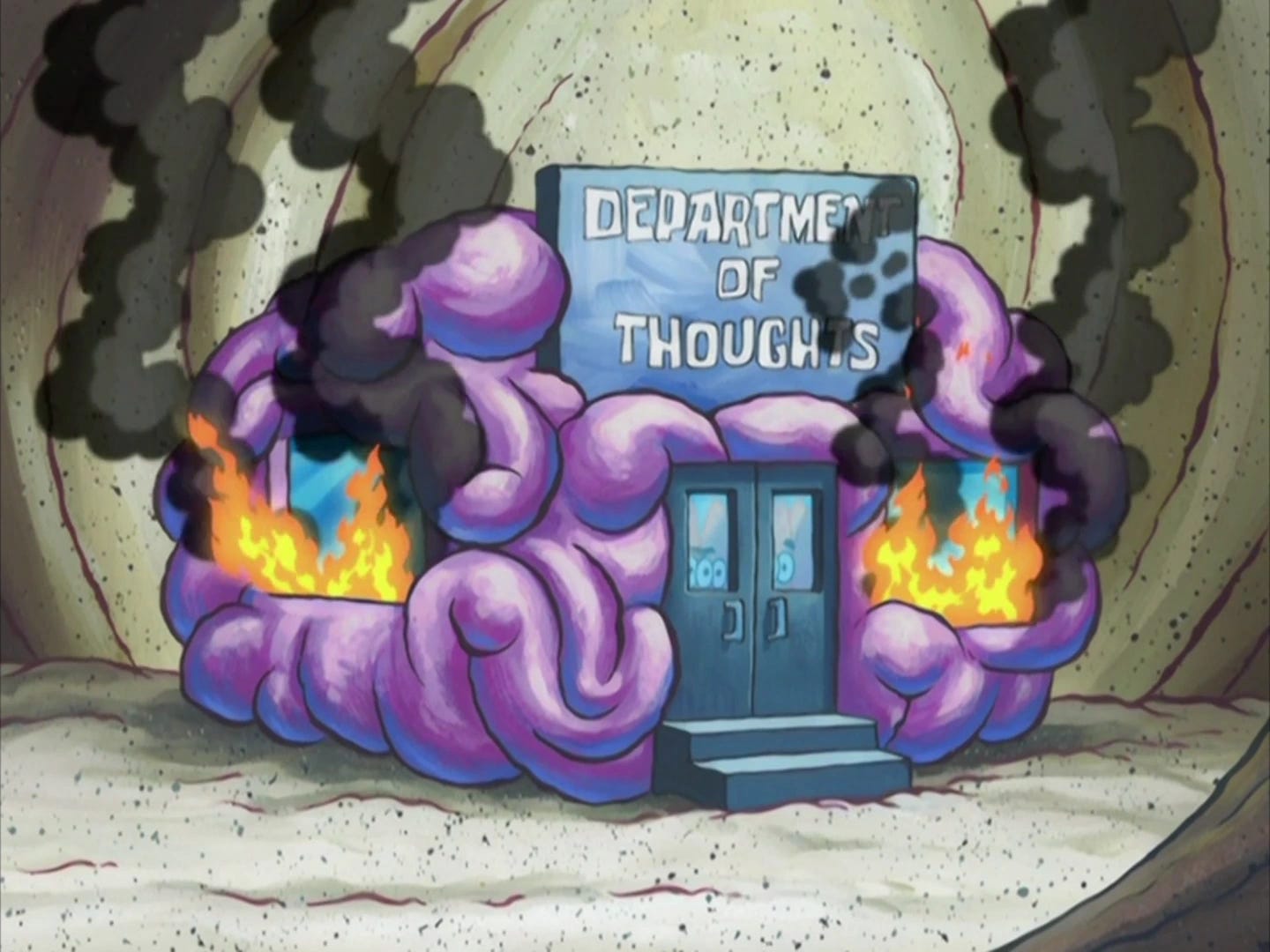On the State of the Substack
My dearest Film Freaks,
On October 27, 2024, after Acquired Tastes' first internal review, the Acquired Tastes team elected to withdraw from the fabric of time and space. The intervening six months have seen a sharp decrease in the frequency of publication as the Acquired Tastes team has attempted to “raise our editorial standards.”
Insofar as the publication has all but ground to a halt, we1 consider this effort a limited success2. Having completed our second internal review, Acquired Tastes would like to update you on the publication's internal affairs and issue updated Terms of Service.
Since October, our team has been working on a comparative analysis of seven cinematic adaptations of Bram Stoker’s 1897 novel, Dracula.
We recognize that nobody asked for this, and that the publication’s pivot to such myopic material is not the most effective way to expand readership. Nevertheless, the Acquired Tastes team remains sanguine about the publication's future.
This project necessitated the development of a robust critical framework rooted in pre-existing scholarship, a process further prolonged by the “scope creep” that so often plagues developing projects. We hope to publish our Dracula piece before we die.3
On a more existential level, Acquired Tastes has been attempting to establish a stable sense of purpose. Amid our soul-searching, fractious internal debates have roiled among our staff.
Critical Divisions re: Film Criticism
Two factions have emerged: the “Consumerist Critics” and the “Navel-Gazers.” Their intellectual and philosophical disagreements speak to more profound questions regarding film criticism’s form and function.
Acquired Tastes acknowledges that the divisions among our staff are not anomalous. Our internal disputes have arisen from a contentious discourse amongst critics that has raged for over half a century.
In fact, the substantive disagreements between Acquired Tastes’ “Navel-Gazers” and the “Consumerist critics” are well-encapsulated in the clash of critical titans, Roger Ebert and Richard Corliss, during the spring of 1990.
In the March-April issue of Film Comment, editor-in-chief Richard Corlis published a spicy swan song titled “All Thumbs: Or, Is There a Future for Film Criticism?” that took issue with Roger Ebert, whose program, Siskel & Ebert, had ushered in a new era of televisual film criticism.
Corlis, the Navel-Gazer’s chosen champion, wrote:
“In today’s movie criticism, less is more. Shorter is sweeter. Today’s busy consumers want just the clips, ma’am. And an opinion that can be codified in numbers, letters, or thumbs…Traditional considerations of directorial style, social import, and the film’s place in film history are luxuries unobtainable in a no-frills review…
“In this cramped universe, the traditional film critic might as well be writing in Latin. The long view of cinema aesthetics is irrelevant to a moviegoer for whom history began with Star Wars. A well-turned phrase is so much throat-clearing to a reader who wants the critic to cut to the chase: What movie is worth my two hours and six bucks this weekend? ...
“Movie criticism of the elevated sort, as practiced over the past half-century by James Agee and Manny Farber, Andrew Sarris and Pauline Kael, J. Hoberman and Dave Kehr…is an endangered species… soon it may perish, to be replaced by a consumer service that is no brains and all thumbs.”
Roger Ebert, chosen champion of the Consumerist Critics, published a response in the May-June issue of Film Comment. In an essay titled, “All Stars: Or, Is There a Cure for Criticism of Film Criticism? Pt. 2” Ebert writes:
“The age of the packaged instant review is here, and lots of moviegoers don’t have time to read the good, serious critics—the Kaels and Kauffmanns. Thumbs, star ratings, grades, and the marvelous Franklin scale have made it unpopular, if not impossible, for critics to deliver an ambiguous or uncertain opinion of a movie…
“What Corliss does not realize is that this is an improvement, not a deterioration, of the situation as we both found it in the mid-Sixties… a time when there was no regular film criticism on national or local TV…
“The bottom line is that mass-produced Hollywood entertainments dominate U.S. movie exhibition, and most moviegoers seem to like it that way.”4
Acquired Tastes recognizes that the landscape of criticism has continued to change in the thirty-five years following the clash between Corliss and Ebert. As a result, neither the Consumerist Critics nor the Navel-Gazers regard their champion’s writing as gospel, yet their exchange animates the factional disagreements within Acquired Tastes.
Meet the Factions
In one corner, we have the Consumerists: disciples of Ebert’s approach to film criticism. They seek to separate the wheat from the chaff, sparing you the effort and, most crucially, the time.
You see, whereas Siskel & Ebert advised consumers whether or not a movie was worth the price of admission, the contemporary Consumerist critic understands that the attention economy’s most valuable currency is your time.
With the wide world of film available at the click of a button, their consumer-oriented mode is functionally curatorial, optimizing conditions for a more meaningful relationship between consumers and media.
Their reviews are tantamount to recommendations, and they’re more likely to communicate a film’s value in a more binary (i.e., worth your time or not) and/or quantitative methods. A five-star endorsement dwarfs a three-and-a-half-star endorsement, and the difference is apparent at a glance.
In the other corner are the Navel-Gazers, a high-falutin lot less concerned with consumers and more preoccupied with the cinematic form and its sociocultural function.
Ask them if a given movie is “good,” and they’re apt to ask you what a “good movie” even is. They prize engagement with “interesting” films over the consumption of “good” ones, and they begin with the supposition that film — good, bad, and ugly — is worthy of consideration. They’re well aware that the majority does not share their mode of engagement, but they don’t regard that fact as a reason to change.
Due to the Navel-Gazers’ affinity for interpretation within “robust critical/theoretical frameworks,” coupled with their willingness to devote inordinate amounts of time to hyper-specific interests, their work is functionally useless to the average consumer.
Driven by an unbridled passion for the cinematic form and the art of criticism, the Navel-Gazers believe there’s a right and wrong way to engage with film, that you’re probably doing it wrong, and that they can rectify that if only you would listen to them. At their core, they’re idealists, but when other people don’t share their ideals, Navel-Gazers get haughty.
Their self-professed erudition renders them emotionally remote and slightly insufferable. Yet the discursive disposition of their criticism betrays a deep desire to connect with similarly inclined critical minds, hoping to foster discussions and compare interpretations to yield further insights.
In truth, they’re a lonely bunch who worry that the mode of active, critical engagement with film is going the way of the dinosaur. Prone to passionate exchanges that risk alienation, Acquired Tastes has been hesitant to allow them free rein.
Collaboration Remains Key
These two factions have been, and will continue to be, collaborators5. In the past, each post has been the product of negotiation between both camps.
Sometimes the Navel-Gazers drive the bus, as they did in our review of Evil Dead Rise, which asserted that the Deadite gore-fest:
“…panders to contemporary anxieties within the American conservative religious consciousness… If rigid constructions of gender are essential to the “symbolic order” that structures how you understand the world, the existence of transgender identity threatens to destabilize your comfortable worldview. The same can be said about women, maternity, and reproductive agency. Seeing as these are central themes of Evil Dead Rise, the film’s text is a fungible funhouse mirror of horrors. Viewers can project their own fears and preoccupations with sex, gender, and bodies onto the film.”6
Other times, the Consumerist Critics take the reins, as they did in our review of Deadpool & Wolverine, which concludes:
“Is the film critical of the hyper-saturated genre, or has it become the corporate product it once savagely ridiculed? Both, but the latter taints the former.
While the film seems to regard that duality as a point of pride, I’m not buying it. Disney executives have approved all the profane transgressions, defanging any of the film’s notional attempts at substantive subversion.
Deadpool & Wolverine will delight its character’s most ardent devotees. More casual fans, such as myself, may find the film a suitably entertaining diversion.
Although the film can’t sustain emotional or intellectual investment among audiences, it will pay dividends to Disney’s investors, which is far more important to the MCU’s future than any of Deadpool & Wolverine’s acts of heroism.”
But every so often, a movie which The Consumerists regard as trash, The Navel-Gazers deem a treasure. Acquired Tastes has struggled to determine which faction’s assessment should be elevated in these cases.
Megalopolis and a Vision of the Future
Last year, upon viewing Megalopolis, Acquired Tastes ran an experiment that allowed both factions to weigh in on Francis Ford Coppola’s guilded opus.
The Consumerist Critics published a spoiler-free review that lambasted the film, declaring it “a humbling reminder that ‘great’ filmmakers don’t invariably produce ‘good’ art.”
They concluded, “Megalopolis is philosophical schlock from one of the biggest names in contemporary cinema: a terribly interesting failure that must be seen to be believed but arguably isn’t worth seeing because, well, it’s a terrible movie.”
The Consumerist Critics make their opinion abundantly clear: Megalopolis is a terrible movie. Thus, Acquired Tastes would not recommend Megalopolis to consumers who only watch a few films a year.
Yet within the review’s conclusion, there remains ambivalence. Megalopolis may be a flop, but it’s a “terribly interesting” one that “must be seen to be believed.” That’s the voice of the Navel-Gazers, clamoring to toss their trademark ambiguity into the mix.
The Navel-Gazers don’t think Megalopolis is secretly a good movie, but they delight in the quizzical ideas that underlie the film’s shambolic efforts to function within the framework of traditional narrative cinema.
So, a few days after the Consumerists posted their review, the Navel-Gazers published their protracted reflections in “The Foibles of Francis Ford Coppola’s Failed Fable and Philosophical Fiction (feat. Ayn Rand)”.
The Navel-Gazer’s propensity to intellectualize the cinematic experience forms the foundation of Acquired Tastes’ unofficial motto: “Everything is interesting if given enough thought.” And to the Navel-Gazers, virtually everything warrants deeper examination: a deeply impractical approach to criticism that, for example, leads to a deep dive into cinematic adaptations of Dracula that has been simmering for over half a year.
It was the Navel-Gazers who, following Acquired Tastes’ initial internal review, sought to withdraw from the fabric of space and time. At that time, the Consumerists were persuaded. However, half a year later, it’s evident that, if left to their own devices, Navel-Gazers will endlessly gaze into their navels7 — hence the need for a second internal review.
Updated Terms of Service
Everything published in Acquired Tastes will continue to cross my desk before approval, and we’ve resolved that each faction should have the freedom to publish without hindrance from the other. To that end, each faction will be granted its own byline.
Although Acquired Tastes began as a weekly publication, we are not ready to recommit to a weekly publication schedule. We anticipate our publication intervals will vary as our fledgling factions settle into their respective grooves.
In lieu of promising one newsletter delivered to your inbox every week, Acquired Tastes promises that you will receive a maximum of one email per week — never more.
While Acquired Tastes will only publish material it thinks worthwhile, we maintain no illusion that everything we publish is worthy of your time and attention.
So, if more than one article is published weekly, Acquired Tastes will compile a “weekly smorgasbord” to be dropped into your inbox for your sampling pleasure. If nothing new has been published that week, you’ll get nothing.8
Every member of the Acquired Tastes team remains appreciative of each and every one of you. Your time and attention are valuable, and we’re honored by every click, comment, and view.
In the forthcoming weeks, expect a review of Wolf Man (2025) from the Consumerist contingent and a piece from the Navel-Gazers all about the Dracula piece they didn’t end up writing.
Each faction thinks the other’s piece useless, and perhaps they’re both right, but we’ll let you be the judge of that.
Follow us via the Substack app to never miss a post.
Until next time, Film Freaks.
I, Skylar Singer.
Heavy emphasis on limited.
While Acquired Tastes’ internal data suggests death is not imminent, all external data suggests it is inevitable. While we lament this fact, it is preferable to the lifestyle of the eternal undead.
Roger Ebert’s statement of this fact is not tantamount to an endorsement. On the contrary, Ebert’s portrait of film criticism circa 1990 is equally laudatory and lamentatory.
He believes more accessible film criticism is an improvement, but believes criticism’s power to influence the consumer is negligible when compared to the studio’s marketing campaign, which utilizes the allure of movie stars to promote their projects in a media blitz with no regard for quality. The influence of Ebert’s televised criticism cannot compete with Tom Cruise on the cover of People Magazine, appearances on morning shows, etc.
Insofar as the “Acquired Tastes team” is a pseudo-delusional extrapolation of myself, the Consumerist Critics and the Navel-Gazers are intertwined with the DNA of Acquired Tastes.
After publishing our review of Evil Dead Rise, a friend called and said I completely misunderstood the movie. They claimed the film was nothing more than a sizzle reel of gore effects and implied that the text did not support the substance of my review. Although I disagreed, I found the conversation invigorating and enjoyed every moment of it.
The pitfalls of navel-gazing are perhaps best embodied by Acquired Tastes’ attempts to find meaning in Sam Levinson’s The Idol, which aired on HBO in the Summer of 2023. You can read the Navel-Gazers’ embarrassing, hallucinatory, and ultimately aborted analysis here.
Absence makes the heart grow fonder, dunnit?


















Allow the Navel Gazer's their space to Navel Gaze...but let those Consumerist Critics chase the dopamine. Good to have you back.
Good to hear from you again, via your internal affairs self-reflection! I'm willing to hear more about the Dracula franchise, up to a point, at least. (Especially if it involves the various versions of "Nosferatu.")